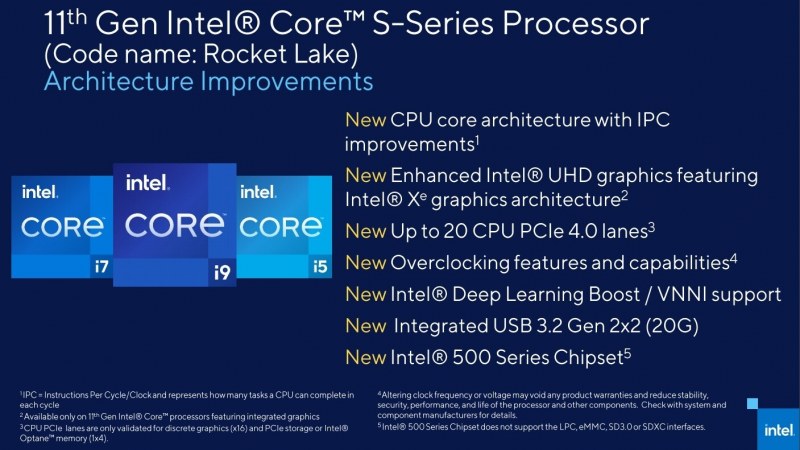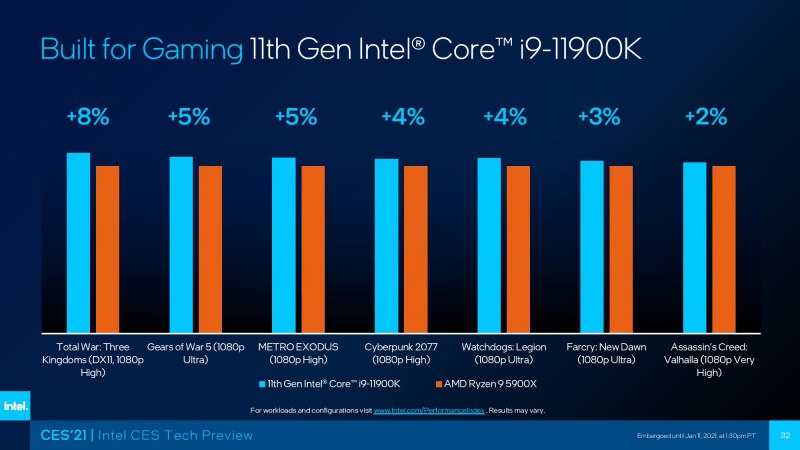Intel 11th Gen Desktop Processor Comparison With AMD Ryzen 5000 Series Processor

Intel is planning to launch the 11th Gen desktop processor in March 2021.
There have been several leaks about the specs and benchmarks in the past months, and we are sharing here all the details we have gathered so far.
Intel has also shared some of the details and I am including that we know so far in this post.
Before we proceed to get into the details about the Intel next-gen processors, if you want to read about the Ryzen 5000 series desktop processors, that AMD released. Please go ahead and have a look at the article – AMD Ryzen 5900X, 5800X, 5600X Launch, Price, Specs, Benchmarks.
Intel 11th Gen Rocket Lake Processors – What’s New and Old?
The flagship processor this year will be the Intel Rocket Lake Core i9 -11900K. There will be Intel Core i7 11700K and Core i5 and Core i3 processors. One thing that disappoints Intel fans is that all processors in the 11th Gen are based on the 6-year-old 14 Nm manufacturing process.
AMD on the other hand has already moved to a superior 7Nm process for the Ryzen 5000 series. AMD has bridged the gap in terms of Single Core performance with Intel and is better than Intel in Multi-Core workloads.
On the other hand, Apple has rightly ditched Intel and has moved to manufacture its ARM-based processors (M1 based on 5 Nm process) for the Macbooks and the iMacs that pose a major threat to both Intel and AMD.
Intel is working on the 7Nm manufacturing process and even there are talks that the company will outsource some of the manufacturing to TSMC but these processors will come in 2023.
The positive side is that Intel is going with all-new CPU architecture (codenamed – ‘Cypress Cove’) to bring out maximum performance they can squeeze from the old 14 Nm process.
The new Intel architecture consists of 10nm Ice Lake cores but these are backported to 14nm by Intel, combined with the Tiger Lake Graphics architecture to offer a significant gain in IPC and also a boost in the graphics performance.
Top Features and Details
New Intel processors will have enhanced Intel UHD graphics (featuring Intel Xe Graphics Architecture) that we have seen in the Intel 11th gen laptop processors.
Also, the new processors will come with up to 20, 4th Gen PCI-E CPU lanes, and overclocking features. Intel is also teasing improvement in Deep Learning.
Further, the company claims that the new CPU architecture will give a 19% improvement in the IPC (Instruction per clock). This is a big jump considering they are still using the same process node.
We will get a 50% improvement in graphics thanks to the better-integrated Intel Xe Graphics card. Additionally, the Intel Deep Learning Boost will help in enhancing the AI performance.

Let’s take a glance at the spec sheet of Core i9-11900K – the flagship processor from the brand.
The Core i9-11900K is the top of the line gaming/work CPU with many new advancements. Intel claims that it will be the best ever gaming/productivity processor that the company has ever made.
The processor will have 8 Cores and 16 Threads. Yes, you are thinking right – it is less than that of the 10th gen Core i9 (10 Cores/20Threads). Also, it is far lower than the AMD Ryzen 5900X that comes with 12 Cores and 24 threads, and even lower than the Ryzen 5950X that has a 16C/32 threads design.
The processor is likely to have a 3.5 GHz base clock speed and up to a 5.3 GHz turbo boost. Intel is banking on the boost clock performance and they very well know that if they can’t compete with AMD in Multi-Core performance then it’s better to beat the team Red at the Single-Core performance.
The increased Single-Core performance will also help Intel in Gaming and gain back the lead in the Single-Core performance.
Intel has added four new PCIe 4.0 lanes for direct SSD and discrete GPU, instead of 16 in previous-gen processors.
The company will also reveal the 500 series chipset based motherboard along with Rocket Lake Desktop processors.
Comparing Intel 11th gen Rocket Lake desktop processor with AMD 5000 series processor:
Intel has shown some performance benchmarks of their new CPUs comparing them with the AMD 5000 processors in AAA gaming. Here, the data shows that Intel is winning in some of the titles.
Comparing Intel i9 11900K Vs AMD Ryzen 5900X in Gaming
The graph presented by Intel shows that Intel is ahead of AMD only by 2% to 8%. Also, these are benchmarks by Intel and not by Independent reviewers and the games can be carefully chosen. More independent benchmarks pay to show a very different picture.

We will update the details once more information and independent benchmarks are available.
What benefits Intel?
The only saving grace for Intel can be the price advantage and availability of the processors.
The AMD Ryzen 5000 desktop processors have faced a supply shortage leading to the rigging of prices by the sellers. Intel may have better control over the supply and may offer discounts to take some share away from AMD.
Currently, there is a large price difference of about 10-12K between AMD 5000 series CPU and competing 10th gen Intel processors in the market. We may see the same trend with the Intel 11th Gen processors and Intel may discount the 10th Gen further to retain the market share.
The second factor that can help Intel is the improved integrated GPU that may work better for some of the productivity apps from Adobe and others. However, the lower Core count may offset the gains due to the compromised multi-core performance.
Another factor could be thermal performance. The AMD Ryzen 5000 series run hot (over 90 degrees celsius) and we will have to see how Intel fares in temperature Vs AMD. Can Intel keep it cool and quiet?
Those who will use the integrated XE Graphics card will get a 50% higher performance Vs. the last-gen processors.
Notably, the AMD Zen 3 Ryzen 5000 series CPU does not have integrated graphics.
Let’s have a look at some of the Benchmark Scores for Intel 11th Gen Vs AMD Ryzen 5000 series processors.
Geekbench Scores and Comparison With Ryzen 5000 series processor
The Single-core Geek bench 5 score shows that Intel 11th gen Rocket Lake chipsets core i9-11700K and i9-11900K leads with significantly faster performance. Intel is 5-10% ahead of AMD for single Core performance.
However, in the multicore score, AMD takes a big lead. The AMD Ryzen 5900X processor crushes the Intel i9 and even the Ryzen 5800X is ahead of the Intel 11900K. There is no comparison of 5900X with the Intel i9 11900k.
Based on the above information Intel may have a little advantage in terms of Single Core performance but AMD looks indomitable in the Multi-Core workloads.
Overall, things are not so positive for Intel and the only way out for the company is to offer more discounts and launch products at a cheaper rate than AMD.


